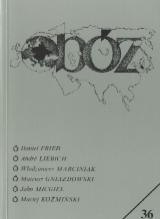Obóz 36 (1999)
Z Katalog.Czasopism.pl
Przejdź do Obóz lub Spisy treści 1999
POSŁOWIE W EUROPIE
Daniel Fried
Wykład wygłoszony dla studentów Studium Europy Wschodniej UW 12 maja 1999 r.
ANALIZY
André Liebich
Pojęcie „Narodu" - między Wschodem a Zachodem
Włodzimierz Marciniak
Pomiędzy dezintegracją a chaosem. Pierwsze miesiące po rozpadzie Związku Sowieckiego
EUROPA ŚRODKOWA
Mateusz Gniazdowski
Gabčikovo-Nagymaros. Słowacko-węgierski spór o zagospodarowanie Dunaju i próby jego rozwiązania
John Micgiel
Powrót Niemców do Europy Środkowej po Zjednoczeniu
MIĘDZY WIERSZAMI
Maciej Koźmiński
Problemy polskiej polityki wobec krajów „obozu" w optyce cenzury PRL u progu III RP (czerwiec - październik 1989 r.)
STUDIA WSCHODNIE
Jan Malicki
Studia Wschodnie UW 1998-1999 (sprawozdanie)
CONTENTS
Daniel Fried
Lecture for students of the Eastern European Studies Program of the University of Warsaw, May 12, 1999
This concise presentation enables the audience to reconstruct the position of the Ambassador of the United States with respect to the challenges facing NATO and its enlargement. He also touches upon the question of whether East Central Europe can be maintained as a „new dividing line”, and assesses „Poland&39;s regional politics” and Warsaw&39;s attempts to overcome the tendency toward this „natural division of Europe”.
Andre Liebich
The Idea of „Nation” - Between East and West
In this sharp analysis, the author, the professor from Geneva who is well-known to Oboz readers, traces the formation of the idea ”nation” in modern sociological and political thought. He also considers the reasons for the distinction between „enlightened Western European nationalism” and „primitive Eastern European
nationalism”, as well as the areas in which these two types are applied and the theoretical outlook for reflections on the idea of nation in light of the further emancipation of various communities, ethnic groups, and societies that has taken place in recent years. He also discusses the West&39;s attitude toward East Central Europe&39;s collective identity, relatively little understood beyond the region&39;s borders, yet so important to its inhabitants.
Włodzimierz Marciniak
Between Disintegration and Chaos. The First Months after the Collapse of the Soviet Union
A reconstruction of the events of 1990-1991, showing how the Russian Federation came to inherit the armaments, resources, and.to a large extent, the prestige and international position of the USSR. The sketch also demonstrates the internal dynamics of the events as a „game” played by Russian politicians with their competitor states up until the „collapse” of the USSR, as well as with the governments of other neighboring countries having an interest in minimalizing Moscow&39;s role and potential in the post-Soviet world. A discussion of the military and administrative evolution of post-Soviet states is also included.
Mateusz Gniazdowski
Gabčikovo-Nagymaros. The Slovak-Hungarian Dispute over the Use of the Danube and Attempts to Resolve It.
A concise sketch showing the history of this dispute over the location of the dam on the Danube, the conditions and convictions motivating both sides, and the regional and local significance of the conflict. The place of this conflict in the internal politics of both countries is also discussed, as well as the possibility that Bratislava and Budapest might reach a compromise.
John Micgiel
The Germans&39; Return to Central Europe after Unification
A summary of the history of German settlement on the territory of Central Europe, and the great German exodus from this region after 1945, comprise an introduction to an analysis of the relationship between the German minority, the communist governments, and Bonn. For the Federal Republic of Germany, as well as for the Central European states, the fate and status of the German minority were an important instrument of international politics. The author also describes the most significant changes that have taken place since 1989 in the region in terms of „minority policies” and briefly presents the role that economic cooperation with Germany has played in the Central Europe during the 1990&39;s.
Maciej Koźmiński
Problems of Polish Foreign Policy with Regard to Soviet Bloc States in Light of PRL documents; Censorship during from June to October 1989
This sketch reconstructs the worldview of censors working during the last years of the Polish People&39;s Republic. In addition to showing their individual convictions, this analysis of censors&39; „notes” demonstrates the fears and preconditions that steered the political elite of the country at that time. Indirectly, this text also helps to explain the relationship between Poland in 1989 and its previous partners from socialist bloc countries who were observing the renegade with suspicion.
Jan Malicki
University of Warsaw&39;s Eastern European Studies Program, 1998-1999
Concise information about the Eastern European Studies Program which began in autumn 1998 at the University of Warsaw, reviving a prewar tradition in this field. The text is comprised of an account of the first year, as well as plans for selection of students for the 2000-2001 academic year, when in addition to the Eastern European program there will also be a Central Asian and Caucasian studies program. Also included is information about activities of the Eastern European Languages School which is associated with the Program. Included as an appendix is a list of regular and post-graduate courses offered within the framework of the Eastern European Studies Program.
